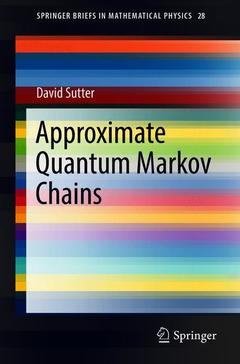This book is an introduction to quantum Markov chains and explains how this concept is connected to the question of how well a lost quantum mechanical system can be recovered from a correlated subsystem. To achieve this goal, we strengthen the data-processing inequality such that it reveals a statement about the reconstruction of lost information.
The main difficulty in order to understand the behavior of quantum Markov chains arises from the fact that quantum mechanical operators do not commute in general. As a result we start by explaining two techniques of how to deal with non-commuting matrices: the spectral pinching method and complex interpolation theory. Once the reader is familiar with these techniques a novel inequality is presented that extends the celebrated Golden-Thompson inequality to arbitrarily many matrices. This inequality is the key ingredient in understanding approximate quantum Markov chains and it answers a question from matrix analysis that was open since 1973, i.e., if Lieb's triple matrix inequality can be extended to more than three matrices. Finally, we carefully discuss the properties of approximate quantum Markov chains and their implications.
The book is aimed to graduate students who want to learn about approximate quantum Markov chains as well as more experienced scientists who want to enter this field. Mathematical majority is necessary, but no prior knowledge of quantum mechanics is required.




